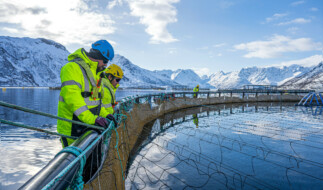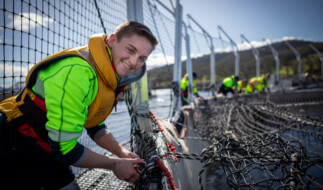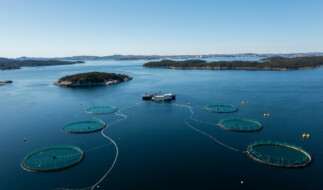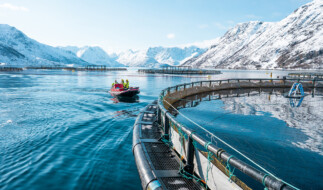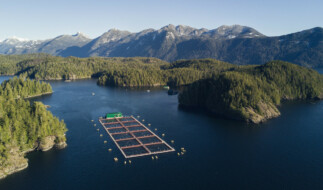Sustainability's Growing Role in Global Guidance

As the world’s population continues to grow, sustainable sources of high-quality protein, including responsibly farmed salmon, will play an important role in supporting global nutrition guidelines and nourishing people.
In the coming decades, the world’s population is projected to increase by nearly 2 billion in the next 30 years[1] – bringing increased pressure on our planet’s resources and accelerating the challenges our global food systems already face. As we work to solve these challenges, we have valuable opportunities to improve widescale human health, and shape social and environmental change for the better.
The first promising sign of progress is that sustainability considerations are increasingly being recognized and included in regional and country-specific dietary guidelines across the world. This rising trend addresses the interconnectedness between environmental challenges, climate change, malnutrition, food insecurity and economic inequality, which has only become clearer in recent years. Food systems leaders are looking to the convergence of nutrition and sustainability for solutions, and dietary guidelines offer a path to reaching millions of consumers worldwide and driving responsible changes to their dietary patterns.
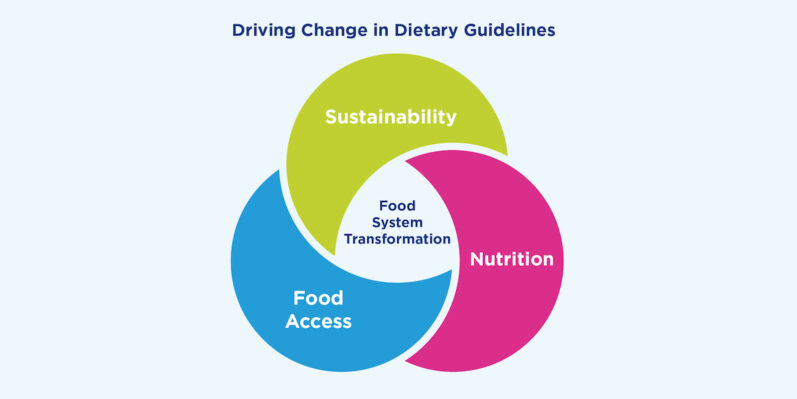
Dietary guidelines can help drive responsible changes to dietary patterns.
Sustainable Nutrition in Dietary Guidelines
Countries leading the way in incorporating environmental considerations into their dietary guidelines include Belgium, Chile and Mexico. One of the most recent and robust examples of this positive trend, can be found in the Nordic and Baltic regions. Released in June, the Nordic Nutrition Recommendations 2023: Integrating Environmental Aspects (NNR2023) explicitly provides – for the first time in its 50 year history – “recommendations not only about what food is good for our health, but also what is good for the environment.” While this report is regionally focused, other countries exploring sustainable dietary guidance likely will look to it as a source of inspiration.
So, what does it say? In brief, NNR2023 emphasizes the health and environmental benefits of plant-based foods over animal-based foods and raises awareness about the environmental impacts of production practices for specific food groups. Two specific points rose to the surface related to the global aquaculture sector:
- Increase consumption of blue foods – NNR2023 recommends “ample intake of fish,” specifically 300-450 grams of seafood each week, with at least 200 grams of that from fatty fish for sufficient omega-3 fatty acids.
- Focus on lower environmental impact – The report recommends shifting toward sources of fish and seafood with lower environmental impacts.
Late last year, Chile’s Ministry of Health, Department of Nutrition and Food released their updated Dietary Guidelines for Chile. The guidelines are focused on the four domains of healthy and sustainable diets: health, environment, social and economic. One of the ten key recommendations is to increase the consumption of fish, shellfish and algae. Chile’s guidelines recommend consuming fish and seafood at least two times per week for nutritional benefits and encourage fatty fish, including salmon, for greater content of omega-3 fatty acids.
These guidance documents align with the scientific evidence behind the 2019 EAT-Lancet Report and the Blue Food Assessment, which prioritize consumption of fish within animal-based protein options – alongside more responsible management of the world’s oceans. Expanded adoption of these and other sustainable nutrition guidelines likely will increase consumption of fish – and with overfishing already a concern, wild stocks alone will not be enough. Certified, sustainably farmed fish – including salmon – offers an important option for meeting the nutrition needs of the growing global population and the planet.

Salmon is a nutrient-dense protein and an excellent source of healthy fats.
The Benefits of Sustainably Farmed Salmon
In general, seafood offers “protein with benefits,” as the experts at the Seafood Nutrition Partnership have described, because it contains essential omega-3s, can help with children’s brain and eye development and improve memory in older adults.
For salmon, farmed species have a similar nutrient profile to that of wild species, offering a nutrient-dense option with high-quality protein and healthy fats like omega-3s. The average 3.5-ounce (100 g) portion of farmed salmon contains 41% of the recommended daily intake of protein and at least 20% of the recommended daily intake of vitamins B3, B5, B6, B12, D and E and selenium.
How to buy Sustainable Seafood
One way to ensure you know you’re purchasing responsibly sourced salmon and other seafood products is to purchase products with sustainable seafood certifications, such as Aquaculture Stewardship Council (ASC)-certified products.
Global Salmon Initiative (GSI) uses the ASC as our reference point for sustainability as it is highly regarded as the most rigorous of farmed seafood certification available based on its strict environmental and social measures. To achieve certification, farms must meet over 500 compliance points and undergo regular audits to ensure that they continue to meet all performance requirements.
In future updates to global dietary guidelines, policymakers are consistently recommending third-party sustainability labels such as ASC, as they can assist consumers in making more environmentally friendly choices and reward farmers who are helping improve the sustainability of their operations.
What are we doing?
GSI applauds the development of global dietary guidelines that integrate sustainability – and the enormous positive impact that shifting consumption patterns will have to help transform the food sector and build greater resilience to challenges such as climate change. As a sector, we have been working collectively with our members and associate members, for more than a decade, to farm salmon that is raised to be better for people and planet. To build a sustainable food system for the future, it will take all actors – farmers, retailers, consumers, scientists and policymakers to help set the right frameworks and direction, and evolutions in dietary guidelines like we see here to better build awareness of healthy and sustainable options is a step in the right direction.
Together we can use the right science and information to drive active changes to dietary patterns and farming operations – and create transformation and drive healthy, sustainable food systems.
